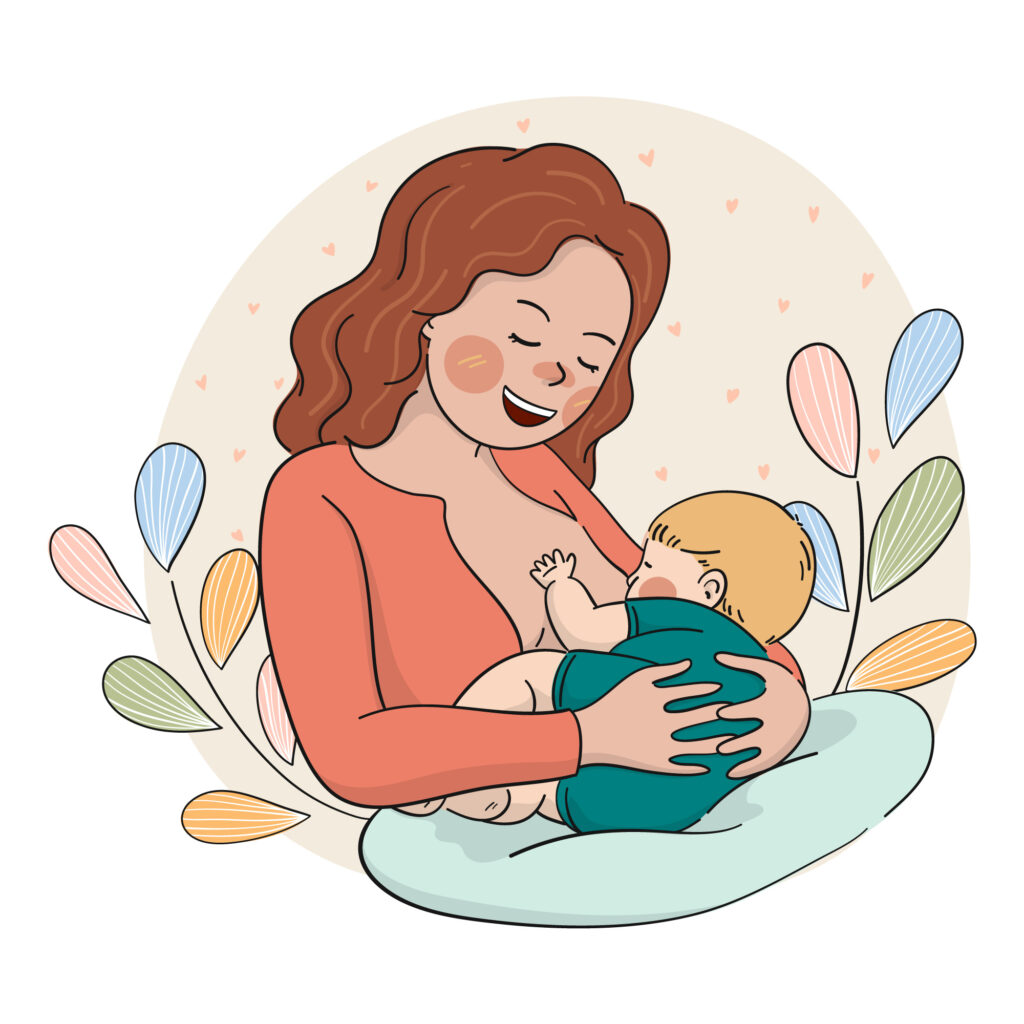
Breastfeeding is a healthy and natural way to feed your baby. It supplies vital nutrients and antibodies that aid in preventing disease and nurturing normal development. It is the best way to feed newborns, according to major global health organizations including the American Academy of Pediatrics (AAP) and the World Health Organization (WHO).
Health Benefits for the Nursing Mother
New mothers often find the transition to parenthood challenging. Pregnancy and childbirth bring significant physical and emotional changes. However, breastfeeding can help mothers regain their physical and mental well-being. This article explores how breastfeeding benefits both the mother and the baby.
- Promotes Post-Pregnancy Weight Loss Quick:
Every time a breastfeeding mom nurses her baby, her body burns calories to make breast milk. Breastfeeding also causes the uterus to contract, making the body work harder to return to its pre-pregnancy size. Most breastfeeding moms lose weight quickly after giving birth.
2. Breastfeeding helps the uterus contract:
Your uterus grows significantly during pregnancy, expanding from the size of a pear to nearly filling your entire abdomen. After childbirth, the uterus undergoes a process called involution, which helps it return to its previous size. This process is driven by the increase in the hormone oxytocin during pregnancy. During labour, the body produces large amounts of oxytocin to aid in delivery and reduce bleeding. This can help you feel more connected to your new baby. Furthermore, research has shown that mothers who breastfeed often experience less postpartum blood loss and a faster uterine involution process.
3. Breastfeeding may stop periods:
Breastfeeding your child can help delay ovulation and menstrual cycles. This natural interruption of menstrual cycles may allow for more time between pregnancies. You can view this as an additional benefit while you cherish precious moments with your child.
4. Decreases Breast Cancer Risk:
According to research, the longer you breastfeed, the lower your risk of breast cancer. This is because breastfeeding women have fewer menstrual cycles over their lifetime, resulting in less exposure to estrogen, which can contribute to certain types of breast cancer. Another theory is that breastfeeding helps strengthen the defences of breast cells against cancer-causing changes.
5. Saves time and money:
Breastfeeding can help you save money compared to buying expensive baby formula and supplements. It also saves you time and effort, as you don’t need to mix, warm, or prepare bottles. Breastfeeding is a convenient and cost-effective option for feeding your baby.
6. Reduces Depression and Postpartum Risk:
- Postpartum depression (PPD) can start soon after having a baby. A study in 2012 found that women who breastfeed are less likely to experience PPD compared to those who stop breastfeeding early or don’t breastfeed at all. However, women who develop PPD soon after giving birth tend to have more difficulty with breastfeeding and do it for a shorter time. If you’re experiencing any symptoms of PPD, which can include, it’s important to consult a gynaecologist as soon as possible.
- Insomnia
- Loss of appetite
- Intense irritability
- Difficulty bonding with the baby
The Benefits for the Infant
Breastfeeding offers many benefits for your baby’s health and development. It provides a nutritious diet and a strong, natural start to life. If breastfeeding is possible, it can bring numerous advantages for your baby’s physical, mental, and emotional well-being.
- Breastfeeding promotes stronger bone development:
Your child’s skeletal frame will grow stronger. According to studies, 8-year-olds who were breastfed for at least three months had denser bones in their spine and neck compared to those breastfed for less than three months or not at all.
2. Babies who are breastfed have good cholesterol levels:
Breast milk is rich in cholesterol compared to infant formula. While high cholesterol is not ideal for adults, babies require cholesterol for their development and overall well-being. The elevated cholesterol levels in breast milk help shape the newborn’s metabolism to become more resistant to high cholesterol and other dietary fat problems as they grow older.
3. Breastfeeding may help prevent obesity in the future:
Research shows that the protein hormone leptin in a mother’s milk can affect a baby’s body composition and growth. This may influence the baby’s ability to self-regulate calorie intake and feel satisfied with food. Breastfeeding may help with weight management and protect against childhood obesity. Studies also indicate that breastfed babies have lower insulin levels, which can aid in managing obesity.
4. Better immune system:
Breastfeeding can help protect your baby from different illnesses because breast milk contains many immune factors that prevent diseases. Breast milk may continue to provide protection even after your baby stops breastfeeding, and your baby’s immune system keeps getting stronger compared to babies who were not breastfed.
5. Nursing lessens the risk of allergies:
Breastfeeding can be beneficial for your baby’s health. It may help protect them from developing certain allergic conditions, like allergic rhinitis and atopic dermatitis. Studies show that babies who were exclusively breastfed for the first two years of their lives had a lower chance of developing these types of allergies. Breastfeeding provides your little one with important nutrients and antibodies that can strengthen their immune system and reduce the risk of allergic reactions.